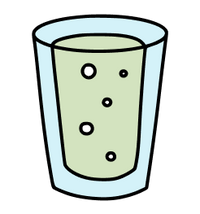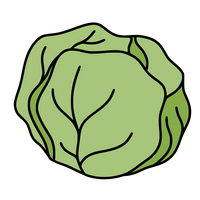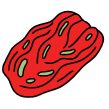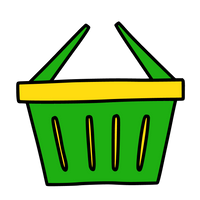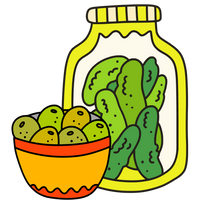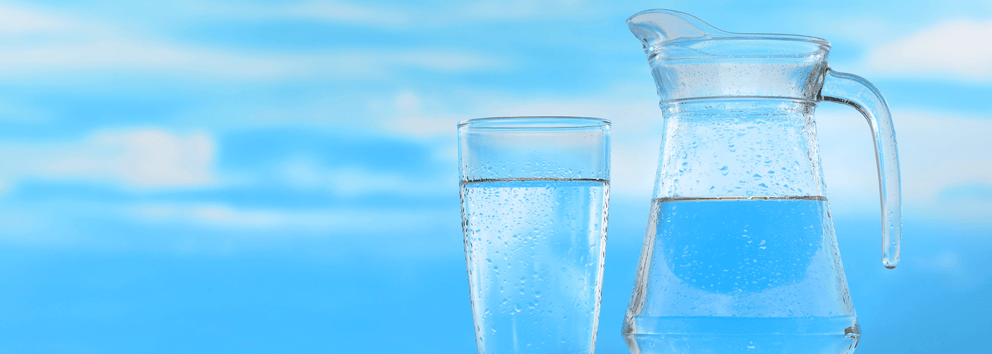
From the time you were young, you've known drinking water is important. You also probably know it's important to take care of your gut health. But did you know the two go hand in hand? Read on to discover the link between hydration and gut health.
Drinking more seems to be the answer to every ailment.
Headache? Drink more water.
Groggy? Drink more water.
Bloated? Drink more water.
Can't sleep? Drink more water.
While it may not cure everything, water helps with staying hydrated and keeps your body functioning as it should. It's necessary for just about everything, including nourishing your gut and keeping your digestive system running smoothly.

The Importance of Hydration for Digestive Health
The gut is often referred to as the second brain, but this is only the beginning of the importance of gut health.
Your brain tells your body how to behave through neurons, which are cells found in the brain and central nervous system. There are about 100 billion neurons in the human brain.
The gut contains 500 million neurons, which are connected to your brain through nerves in your nervous system.
If your gut isn't healthy, this affects the communication with your brain, which can, in turn, affect your body in various ways, leading to adverse health effects.
Does drinking water help with gut health?
Staying hydrated is vital for many different things, including your gut health! When it comes to the health of your gut, your water intake is just as important as your food intake.
The human body is made up of a large percentage of water and needs it to function properly. It's your body's principal chemical component and makes up about 50% to 70% of your body weight. Every cell, tissue, and organ in your body needs water to work properly.
Adequate hydration is vital for digestive health. It can help regulate your bowel movements, prevent constipation, aid in breaking down foods, promote the balance of good bacteria in the gut, and encourage your body's natural detox process.
Your body uses fluids to help move food through your system. If there is no fluid available, this can lead to slow digestion, constipation, and bloating. In some cases, this can even lead to stomach ulcers or acid reflux issues.
How much water should I drink?
There's no perfect answer to this question.
It's important to remember that you lose water through breathing, sweating, urine, and bowel movements. This means there are a lot of variables that go into how much you may need.
According to the U.S. National Academies of Sciences, Engineering, and Medicine, an adequate daily fluid intake is:
-
About 15.5 cups of fluids a day for men
-
About 11.5 cups of fluids a day for women
The Institute of Medicine (IOM) recommends:
-
About 13 cups of fluids each day for men
-
About 9 cups of fluids each day for women
While these numbers may not be perfect, using them as a guide can help you stay hydrated and boost your overall health.
What Affects Daily Water Needs
Many factors determine your hydration needs, and your body may need more water one day than the next.
Climate. Hot or humid weather can make you sweat, increasing your need for fluids.
Exercise. If you're doing any activity that causes you to sweat, you'll need to drink extra water to cover the fluid loss.
Illness. Your body loses fluids if you have a fever, if you're vomiting, have diarrhea, or if you are dealing with other types of illness. So if you're feeling under the weather, drink up!
Pregnancy or breastfeeding. Those who are pregnant or breastfeeding require additional fluids to stay properly hydrated.
Diet. Excessive amounts of coffee or caffeinated beverages can cause water loss through urination. Foods high in salt, spices, or sugar can also affect water retention and lead to dehydration.

Tips for Staying Hydrated
If you tend to go through the day without consuming any water, or very little, it can be hard to get into the habit. We hope these simple tips help you increase your daily intake for a healthy gut and to feel your best mentally and physically!
-
Set a water goal for yourself
Whether it's drinking more water or reading a certain number of books in a year, setting a goal for yourself can help you stay motivated and feel accomplished!
Start the day with a glass of water before your morning coffee for a boost of hydration to start your day off strong.
Keep a water bottle handy throughout the day as a visual reminder to hydrate and stick to your goal.
-
Flavor your water
It doesn't have to be boring! Adding fruit or herbs to your water can help switch things up and encourage you to drink more. Brewing fruit or herbal teas is another way to increase your intake without sipping plain water.
-
Know the signs of dehydration
Even slight dehydration can begin to affect your body. This is why knowing the signs of dehydration and learning to listen to your body's cues is key. Then, you'll be reminded to drink more water when the sleepiness, moodiness, etc., hits.
Symptoms of mild dehydration
-
Thirst
-
Headaches
-
Bloating
-
Dry skin
-
Muscle cramps
-
Brain fog
-
Less frequent urination
-
Rapid heartbeat
-
Dry mouth
-
Eat Hydrating Foods.
Did you know foods can be hydrating? These foods contain at least 85% water, so they're excellent snacks if you're trying to up your hydration!
-
Cucumber
-
Watermelon
-
Iceberg lettuce
-
Romaine lettuce
-
Spinach
-
Kale
-
Strawberries
-
Broccoli
-
Celery
-
Tomatoes
-
Zucchini

Proper hydration goes beyond your daily water intake.
Staying hydrated involves more than drinking water. Electrolytes are essential to proper hydration.
Electrolytes are essential minerals like magnesium, sodium, potassium, and calcium that carry an electric charge. They’re found in your blood, urine, and sweat and are involved in many essential processes in your body.
One of the main functions of electrolytes is to keep you hydrated.
Electrolytes can be found naturally in foods and in trace amounts in your water. The problem is that most filtration systems and purifiers remove minerals from your drinking water. These filtration systems are important for removing impurities and preventing harmful contaminants from getting into your water. However, the amount of minerals removed from drinking water has led to most Americans to be mineral deficient.
What does this mean, exactly?
Let’s take a look at a few key minerals.
Magnesium
Every cell in your body contains magnesium and needs it to function. It’s an essential part of more than 300 enzymes found in the body. Magnesium plays a role in blood pressure, protein production, nerve function, and control of blood glucose levels.
Sodium
Among other things, sodium helps maintain normal blood pressure, conduct nerve impulses in your brain and nervous system, contract and relax muscles, maintain the proper balance of water and minerals, and transport nutrients through your gut.
Potassium
The primary role of potassium is to help maintain normal fluid levels inside our cells. It also helps muscles contract and supports normal blood pressure.
Calcium
You’re probably familiar with calcium as the mineral that makes your bones strong. While this is true, it also plays an important role in blood clotting and regulating normal nerve functions and heart rhythms.
Minerals are essential to the human body and are necessary for hundreds of functions. Without these essential minerals, many people are mineral deficient and struggle to stay hydrated.
Signs and symptoms of mineral deficiency:
-
Digestive issues
-
Decreased immune system
-
Irregular heartbeat
-
Fatigue
-
Poor circulation
-
Increased thirst
-
Poor appetite
The good news is that the solution is simple.

How to Increase Your Mineral Intake
The best way to care for your health and get the nutrients you need is by looking at your diet. Incorporating these mineral-rich foods can help increase your mineral intake.
Eat foods high in minerals
-
Nuts
-
Beans and lentils
-
Seeds
-
Avocado
-
Dark leafy greens
-
Salmon
-
Seeds
-
Mushrooms
-
Whole grains
Consume high mineral sea salt
Not all salt is created equal, but consuming foods with high mineral sea salt is an excellent source of minerals and an easy way to boost your mineral intake each day.
If you’re worried about consuming salt, let’s remember that salt is nothing to fear! Salt contains sodium, an essential mineral your body needs to feel and function its best. Learn more about salt in our article on The Truth About Sodium And Fermented Foods.
At Olive My Pickle, we use only the highest quality, mineral-rich sea salt in our products. So not only are you enjoying a tasty, gut-friendly snack, but you’re also boosting your mineral intake and ensuring your body stays healthy and not dehydrated.

Consume pickle juice from high mineral sea salt
Did you know that pickle juice made from high mineral sea salt is effective for hydration because of its high mineral electrolyte load? Fermented pickles (versus vinegar pickles) are made with high mineral sea salt, and their juice is very high in minerals sodium + potassium.
Wanna know more about the health benefits of pickle juice? Read more in our Ultimate Guide to Healthy Pickle Juice.

At Olive My Pickle, we make caring for your gut simple. We know real fermented foods can be hard to find, which is why we deliver tasty, fermented foods right to your door.
We offer many fermented foods such as pickles, kraut, kimchi, olives, fermented vegetables, and vegetable brine drinks to help decrease inflammation and improve overall microbial diversity.
Visit our shop to explore our unique fermented foods and start optimizing your gut health today!
DISCLAIMER: THIS WEBSITE DOES NOT PROVIDE MEDICAL ADVICE
The content on this website is for informational or educational purposes only and does not substitute professional medical advice or consultations with healthcare professionals. Always seek the advice of your physician or other qualified healthcare provider(s) with any questions you have regarding a medical condition or treatment and before undertaking a new health care regimen.

